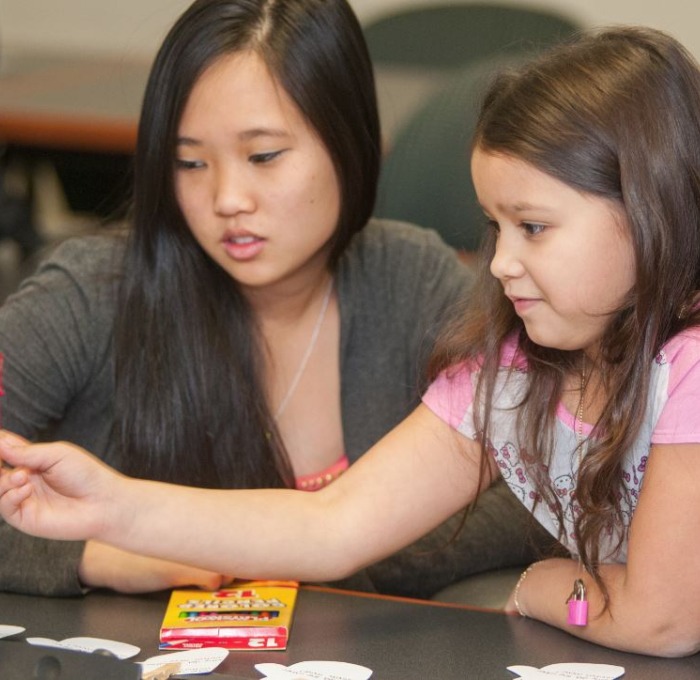
In Short
Designed for individuals who wish to pursue advanced levels of reflection, knowledge, skill and professionalism in the field of education.
By choosing Fitchburg State’s non-licensure education degree program in Pedagogy and Learning, you can:
- Develop as a reflective, student-centered educator.
- Effectively articulate and implement educational theory and research in the field of education.
- Meet your professional development needs within a structured, high-quality, research-based graduate program.
- Tailor your coursework to your interests and career goals.
What we're working on

Program at a Glance: Elevate Your Impact on the Classroom
Enhance your instructional practice, expand your content knowledge, and advance your teaching career with Fitchburg State University’s online Master of Education (MEd) in Pedagogy and Learning degree program. Created for educators like you, this non-licensure degree empowers you to refine your teaching strategies, particularly in curriculum design and differentiation for diverse learners.
Through flexible online courses, you can complete your master’s degree in Pedagogy and Learning in as little as two years.
Pedagogy and Learning Degree Overview
The online MEd in Pedagogy and Learning degree program provides a non-licensure pathway for licensed teachers who want to enhance their instructional skills, learn new teaching strategies, and become a more effective educator and mentor.
While this program does not lead to initial teaching licensure, it allows students to earn graduate-level credits that may be applied toward professional licensure through the Massachusetts Department of Elementary and Secondary Education (DESE).
*If you hold an initial teaching license in Massachusetts, you may use this degree to self-petition to DESE for professional licensure, which requires a master's degree with 12 credits of content and pedagogy specific to the license sought. It is the candidate's responsibility to ensure that they meet the 12 credits of license-specific content and pedagogy required for a professional license through their elective coursework and working with their advisor. This program does not lead to initial licensure.
Focus Areas in Pedagogy and Learning
Your career goals are unique, and your learning experience should reflect that. With guidance from your program advisor, you can customize your teaching expertise with courses in focus areas that matter most to you. This includes nine credits in a content strand to deepen your subject-specific knowledge and nine credits in a pedagogy strand that enhances your curriculum design skills and instructional strategy.
Focus areas include:
- Assessment
- Curriculum and instruction
- Diversity
- Elementary education
- Literacy
- Secondary education
- Special education
- Technology
Note: Courses at the 7000 level or higher count toward your degree in Pedagogy and Learning. Any exceptions require approval from the program chair.
Optional Teaching English as a Second Language (TESL) Concentration
Educators with TESL expertise are essential to supporting multilingual learners and fostering inclusive classrooms. Fitchburg State’s online TESL concentration allows you to build specialized skills in language acquisition, literacy development, and teaching methods. By adding this credential to your portfolio, you can expand your career opportunities and better support learners for whom English is not a primary language.
Learn more about our Teaching English as a Second Language Certificate and how to combine it with the online MEd in Pedagogy and Learning.
Program Length
Earn your MEd in Pedagogy and Learning on your timeline. While you can finish the program in two years, you have up to six years to complete it, allowing you to balance your studies with your professional and personal life.
What Can You Do With a Master’s Degree in Pedagogy and Learning?
Earning an MEd in Pedagogy and Learning positions you, as a licensed teacher, to make a greater impact on student success while opening doors to leadership and instructional design opportunities. You develop the skills to lead professional development programs, evaluate subject curriculum, and support school wide instructional improvements.
Many graduates go on to mentor teachers, shape curriculum policies, or consult on best teaching practices that meet the evolving needs of students. Potential roles include:
- Curriculum Specialist
- Educational Consultant
- Instructional Coach
- Lead Teacher
Admissions Requirements
Take the next step in your teaching career with a master’s degree in Pedagogy and Learning. To apply, submit the following materials:
- An official transcript showcasing a bachelor’s degree from a regionally accredited institution
- Official transcripts of graduate-level coursework from a regionally accredited institution (if applicable)
- Three professional and/or academic recommendations
- Professional resume
- Graduate application and fee
- An essay, no more than one page in length, in response to one of the following questions:
- Tell us about a positive situation in which you helped a person and made a significant difference in that person’s life.
- What are the most important factors in establishing a long-term working relationship with students, friends, etc.?
- Tell us about a significant event that involved you in a teaching or helping mode.
- Describe the situation as it occurred at the time.
- What did you do in that particular situation?
- How did you feel about the situation at the time you were experiencing it?
- How do you feel about the situation now?
- What would you change, if anything?
Fitchburg State University reviews all completed applications on a rolling admission basis.
Tuition and Fees
Fitchburg State believes in affordable, high-quality education. With graduate scholarships and clear tuition rates, you can focus on earning your Pedagogy and Learning degree without financial uncertainty.
I think one of the great things about this program is the flexibility it provides teachers in obtaining professional development at a graduate level that meets their needs as teachers and potential administrators.
Requirements and Curriculum
Become an expert in designing effective curricula, adapting instruction for all learners, and applying research-based teaching methods through Fitchburg State’s 36-credit online master’s degree in Pedagogy and Learning.
Coursework covers core classes in curriculum design, assessment strategies, and educational research, along with electives that explore various topics. A specialized focus area allows you to deepen your knowledge in a subject or teaching method that aligns with your professional goals.
If you have questions about class requirements or the course rotation, email the program chair, Dr. Lynn D’Agostino, at ldagosti@fitchburgstate.edu.
Required Courses (12 Credits)
- EDUC 9005 Dynamic Perspectives in Education
- EDUC 9300 Educational Research
- EDUC 9510 Capstone: Implementation of Best Practices
- A course in curriculum design/development
Electives (6 Credits - Select Two)
- A course in educational technology
- A course in special education
- A course on literacy development relevant to the license under which the student is teaching
Focus Area (18 Credits)
- Content Strand, 9 credits
- Pedagogy Strand, 9 credits
Candidates completing a Pedagogy and Learning Master of Education, upon graduation are expected to:
- demonstrate understanding of and ability to critically analyze current issues in education from various stakeholder perspectives.
- examine curriculum development theories as they apply to specific areas of educational focus and expertise.
- acquire deeper understanding of content and pedagogy, and the skills necessary for ongoing formal and informal knowledge acquisition.
- develop pedagogical skills to plan effective instruction based on knowledge of student diversity, societal issues, curriculum standards, and current research.
- understand the role of technology and demonstrate skills using technology to gather, analyze and present information, enhance instructional and collaborative practices, and support active student engagement
- critically examine and analyze research in education and apply results to improve current practice.
- complete a capstone project that integrates theory and practice, and contributes to ongoing problem solving in education.
Still have questions? We're here to help!
Whether you're exploring your options or ready to apply, our team is here to provide the answers you need. Connect with us to learn more about the online MEd in Pedagogy and Learning degree program and how it can support your professional goals.
- Email an enrollment counselor at gce@fitchburgstate.edu or call 978.665.3182
- Attend an information session
- Watch a webinar





